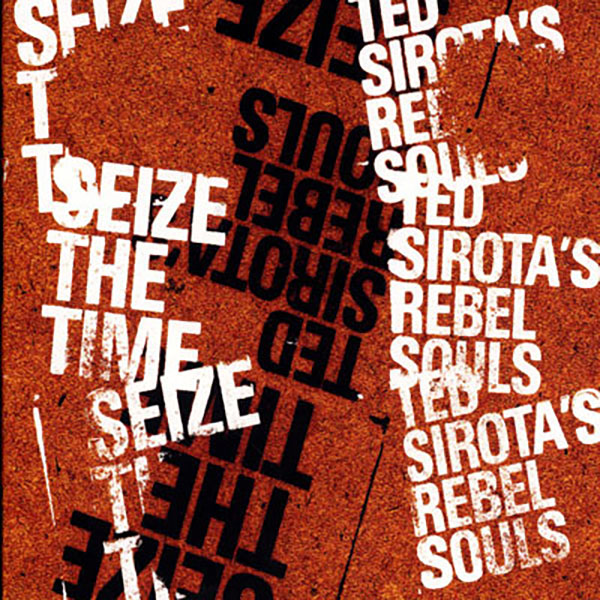
by Ian Mann
June 08, 2009
/ ALBUM
A brave and interesting but melodic record informed by Sirota's uncompromising political stance.
Chicago based drummer Ted Sirota has been leading his Rebel Souls group for over a decade producing the albums “Rebel Roots” (1996),Propoganda (1998) , Vs. The Forces Of Evil(2001) and “Breeding Resistance (2004).As the titles of the records suggest there is a strong political element to Sirota’s work, the drummer is an out-spoken figure in the leftist tradition.
Sirota states; “Seize The Time is dedicated to the many musicians who stood up boldly in the face of oppression and injustice and refused to surrender or back down despite harsh consequences”. The Rebel Souls take the songs and music of some of these figures and meld them into a broadly jazz based framework. Among the diverse figures celebrated on this album are The Clash,Caetano Veloso,Charles Mingus, Miriam Makeba and Stephen Foster. Musically it’s an eclectic and globe spanning mix that incorporates some very different styles into the Soul’s predominately jazz based sound. The group members also contribute a number of original compositions that sit well with the overall concept of the album. In an appropriately democratic arrangement each group member contributes one piece as a writer.
Joining Sirota on this album are Geof Bradfield (tenor sax and bass clarinet), Greg Ward (alto), Dave Miller (guitar) and Jake Vinsel (acoustic and electric bass). Surprisingly the music is a lot less confrontational and “in yer face” than the band name and the album concept might suggest. This is in part due to the melodicism of the chosen material- there are some great tunes here-but is also down to the band’s decision not to be wilfully obtuse or to play music as “art for art’s sake”.
Guitarist Miller’s arrangement of the old Clash classic “Clampdown” starts the album. The group use the stirring melody as a jumping off point for some knotty jazz based improvisation, but without ever losing sight of the spirit of the piece. As the only chordal instrument Miller’s guitar is a vital part of the group and he acquits himself splendidly here both as a soloist and as an accompanist to the horns. Sirota drives the band from the back in authoritative manner.
“13 De Maio” by the Brazilian composer Caetano Veloso celebrates the day that slavery ended in his country. Arranged here by Bradfield the tune is led off by Sirota’s drums and hand claps, building to a sunny, appropriately joyous and celebratory groove. The mood here is of celebration rather than direct confrontation with Miller again making an outstanding contribution.
The late, great Charles Mingus was a celebrated political agitator as well as being a brilliant musician and composer. “Free Cell Block F, ‘Tis Nazi U.S.A.” is still an attention grabbing title and reveals something of Mingus’ personality. It’s probably the most conventionally “jazzy” piece on this album and gives Ward and Bradfield the chance to demonstrate their chops alongside guitarist Miller.
The choice of Stephen Foster’s 19th Century folk lament “Hard Times (Come Again No More”) seems particularly prescient given the current economic climate. Vinsel’s solo bass introduces Bradfield’s suitably dolorous arrangement. Bradfield’s woody bass clarinet features alongside Ward’s alto , the whole shadowed by Sirota’s sympathetic drumming. At times the piece has an almost hymnal air about it.
Sirota’s notes mention a number of musicians they were unable to pay direct tribute to within the confines of the album. Some of the original composition pay oblique homage to these figures. Among the names listed by Sirota are those of Bob Marley and Peter Tosh. Sirota’s “Killa Dilla” an infectious mix of jazz and dub reggae can perhaps be viewed as paying tribute to these two pioneers.
Miller’s original piece, the darkly insidious “Tollway” is a jazz based vehicle featuring solos from Bradfield on bass clarinet and Vinsel on bass. At times atmospheric and impressionistic it’s one of the most beautiful pieces on the record.
“Viva Max!” is an improvised solo by Sirota that pays tribute to the brilliant drummer and civil rights campaigner Max Roach. Whilst it’s only right and proper that Sirota should wish to pay homage to Roach a three and a half minute recorded drum solo does rather tax the patience of the listener and disrupt the flow of the album. Perhaps a band arrangement of one of the tracks from Roach’s “We Insist! Freedom Now Suite” would have been a more rewarding tribute.
Bradfield’s urgent “J.Y.D” is reminiscent of the style of Ornette Coleman, one of the band’s acknowledged musical influences. Both horns make strong contributions as does Miller’s shadowy guitar.
Tenor man Bradfield is also the arranger of Miriam Makebe’s two part composition"Polo Mze” which introduces South African Township elements to an already exotic mix. The insistent second part throws rock and reggae rhythms into the mix. It’s stirring stuff.
From the pen of bassist Jake Vinsel comes “Little D” which combines spooky balladry with Afrobeat grooves- tribute perhaps to Fela Kuti another name on Sirota’s list.
Finally comes Ward’s “The Keys To Freedom” an enervating genre bending piece that again blends jazz soloing with rock, latin and reggae rhythms in inventive and colourful fashion. Sirota’s drums often push to the fore but there is some excellent playing all round on this rousing finale.
“Seize The Day” is an ambitious, sprawling record full of colourful, imaginative arrangements and razor sharp playing. The group blur musical boundaries with aplomb but at around seventy minutes the album is too long and even the most dedicated listener’s attention may start to falter-especially when the drum solo kicks in. Sirota’s uncompromising stance and sheer weight of ideas is admirable and I’m sure this band is a dynamic live act. A brave and interesting record but not quite a true classic.
blog comments powered by Disqus